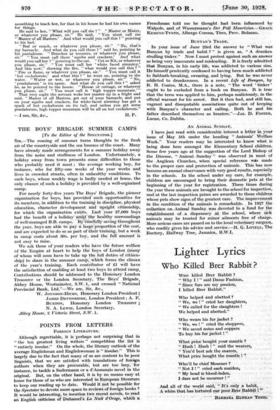POINTS FROM LETTERS
FOREIGN LITERATURE.
Although regrettable, it is 'perhaps not surprising that in " the ten greatest living writers " competition the list is " entirely insular." On the whole, the literary outlook of the average Englishman and Englishwoman is " insular." This is largely due to the fact that many of us are content to be poor linguists, that we are satisfied with translations of foreign authors when they are proCurable, but are too lazy, for instance, to tackle a Sudermann or a d'Annunzio novel in the original. But, on the other hand, it is by no means easy at home for those of us who are interested in European literature to keep our reading up to date, Would it not be possible for the Spectator to devote more space to reviews of foreign books ? It would be interesting, to mention two recent novels, to read an English criticism of Dithamel'a La Nutt d'Orage, which a
Frenchman told me he thought had been influenced by Walpole, and of Wassermann's Der Fall Maurizius.—GRACE KEMEYS-TYNTE, Albergo Corona, Tires, Prov. Bolzano.
BUNYAN'S TRADE.
In your issue of June 23rd the answer to " What was Bunyan by trade and habit ? " is given as, " A drunken strolling tinker." Now-1 must protest against such an answer as being very inaccurate and misleading. It is freely admitted that Bunyan, in his early life, was addicted to various sins. He himself penitently confessed to having been much addicted to Sabbath-breaking, swearing, and lying. But he was never addicted to drunkenness. In a recent Life of Bunyan, by R. H. Coates, MA., there is a note, " The word ' tinker' ought to be excluded from a book on Bunyan. It is true that the term was applied to him, perhaps maliciously, in the official warrant for his arrest. But it then had, and still has, vagrant and disreputable associations quite out of keeping with Bunyan's character and calling. Both he and his father described themselves as braziers."—Jes. D. FOSTER, Lucan, Co. Dublin.
AN ANIMAL SUNDAY.
I have just read with considerable interest a letter in your issue. of May 5th under the heading " Animals' Welfare Week." Your -readers may be interested to . know what is being done here amongst the Elementary School children. Some few years ago at the suggestion of the Lord Bishop of the Diocese, 9' Animal- Sunday " was observed in most of the . Anglican Churches, when special reference was made to. the . proper care and protection of animals.. This has now become-an annual observance with very goo. d results, especially In the schools. .In the school under my care, for example, -children are encouraged to bring their domestic pets at the beginning of the year for registration. Three times during the year these animals-are brought to the school for inspection, and at the last inspection prizes are awarded to those children whose pets show signs of the greatest care.. The improvement in the condition of the animals is remarkable. In 1927 the colleetton ou.-Animal Sunday_ was ,devoted to a fund for the estAblishrnent - of a dispensary .at. the school, where sick animals may be treated for minor Ailments free of charge. More serious cases are passed on to the local, veterinary surgeon, who readily gives his advice and service.—H.. G. Lov.xy.., The Rectory, Halfway Tree, Jamaica, B.W.L.








































 Previous page
Previous page